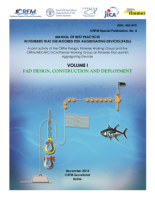FAD design, construction and deployment

It has been more than three decades since initial experimentation with the use of moored fish aggregating devices (FADs) in the Caribbean region. The main driver for development of FAD fisheries has been the need to reduce fishing costs, increase fishing efficiency, to improve fishers’ livelihoods as well as national food security and to reduce fishing pressure on over-exploited coastal resources. However, the development of these fisheries in the region has been influenced by the socio-economic and bio-physical conditions of the respective countries.
This manual on Best Practices in FAD Fisheries Management is being developed as a collaborative effort among the CRFM, the Caribbean Fisheries Co-management Project (funded by the Japan International Cooperation Agency - JICA), the French Institute for Exploitation of the Sea (Ifremer) and the Western Central Atlantic Fishery Commission (WECAFC). These institutions are partners of a regional working group on FAD fisheries that was established at the 15 th Session of the WECAFC and during the period 2014 to 2016 is being led by the CRFM. The impetus for development of the manual originated from the recommendations of a joint meeting of the respective institutions in December 2013, in St Vincent and the Grenadines, which were put forward to the 15 th Session of the WECAFC. This task was explicitly included in the Terms of Reference of the Working Group and in June 2015 the CRFM convened a Write-Shop on FAD Fisheries Management to advance development of the manual. The manual is being published in five separate volumes addressing interests related to FAD design, construction and deployment, maintaining the quality of FAD-caught fish, fishing and business strategies for sustainable anchored FAD fisheries, safety and working conditions of FAD fishers and governance of FAD fisheries. It represents the combined technical efforts of the Working Group partners and targets a wide range of stakeholders, from FAD fishers, to other industry persons, fisheries scientists and managers. To facilitate wider distribution it is also published online (see www.crfm.int).
The experiences that inform the best practices in FAD fisheries management are drawn from a number of regional initiatives, beginning with establishment of the WECAFC Ad Hoc Working Group on the Development of Sustainable Moored Fish Aggregating Device Fishing in the Lesser Antilles in 2001, followed by the JICA-funded study on Formulation of a Master Plan on Sustainable Use of Fisheries Resources for Coastal Community Development in the Caribbean from 2009 to 2012, the project on the Moored Fish Aggregating Devices in the Lesser Antilles (MAGDELESA Project) from 2011 to 2014 (see http://en.magdelesa.eu) and more recently the JICA-funded Caribbean Fisheries Co-management Project being implemented from 2013 to 2018. As well, these best practices are also informed by collaborative research with the Texas A&M University and the University of Florida, Florida Sea Grant. Both the Ad Hoc Working Group and the MAGDELESA Project were led by the Ifremer and focused primarily on examining the scientific information for development of sustainable FAD fisheries, promoting sub-regional cooperation in the sustainable development and management of FAD fishing and the sharing of related information and experiences. The MAGDELESA project also focused on improving the design and construction of FADs and examining fishing strategies, gear selectivity, fish quality, safety and work conditions of FAD fishers and governance of FAD fisheries. The Master Plan Study, through one of its four pilot projects, further improved FAD fishing technology, initiated FAD data collection programmes and explored aspects of co-management of the fishery in Dominica and Saint Lucia. The pilot project also developed a draft FAD fishery Management Plan for Dominica. The current CARIFICO Project is providing additional support to Antigua and Barbuda, St Kitts and Nevis, Dominica, Saint Lucia, St Vincent and the Grenadines and Grenada to develop FAD fisheries and to address issues of governance.







